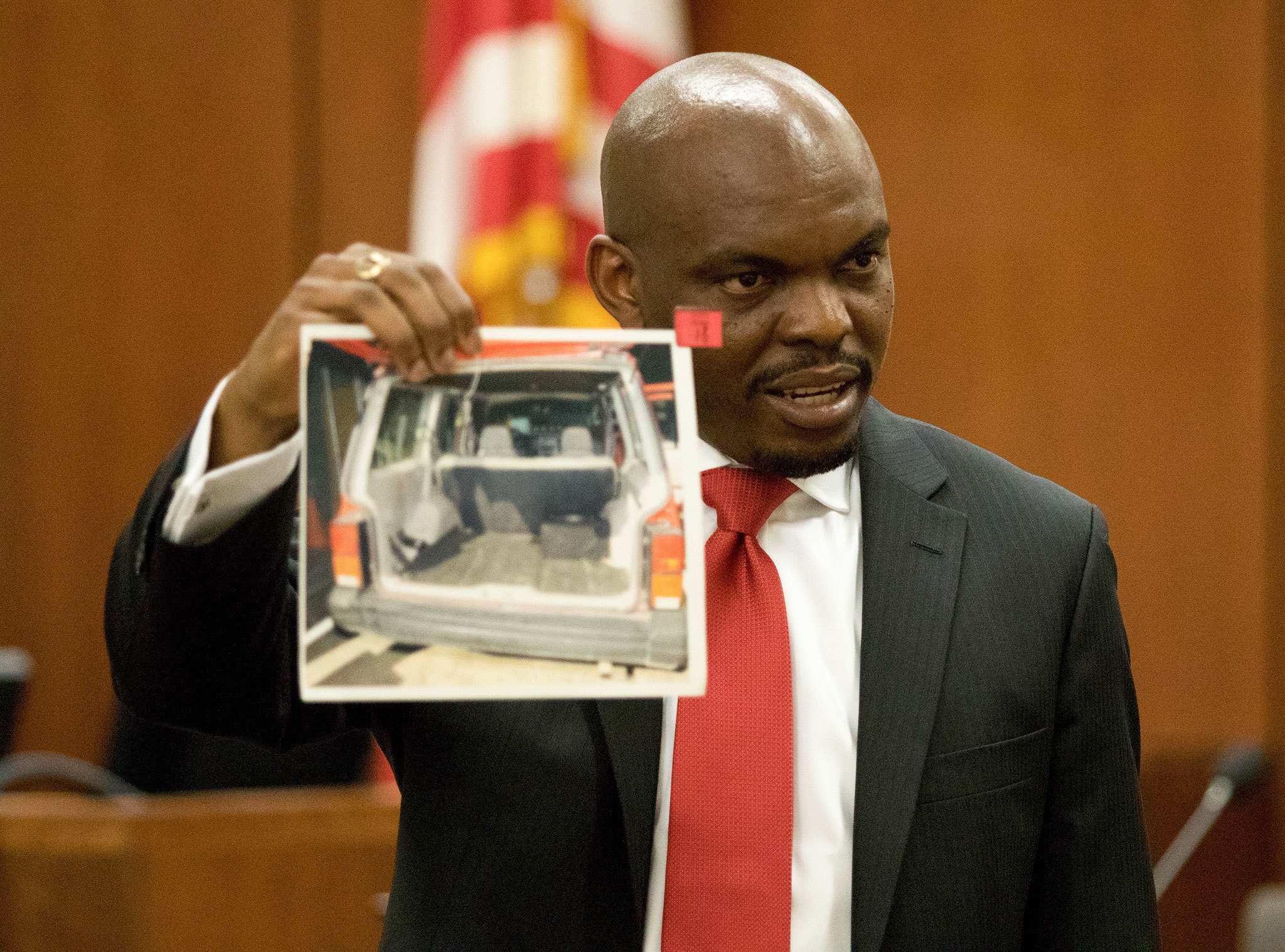EVERETT — The fate of a 2002 murder case remained murky Monday after a Snohomish County judge sent jurors to deliberate without first ruling on a defense motion seeking a mistrial.
Superior Court Judge Linda Krese said she couldn’t find any legal grounds to make a decision before giving the case to jurors.
The jury was expected to return Tuesday morning to deliberate in earnest in the Sept. 23, 2002, shooting death of 18-year-old Rachel Rose Burkheimer. Jurors heard a full day of closing arguments Monday in the case against John Alan Whitaker, 35.
Whitaker, formerly of Lynnwood, is charged with aggravated murder and conspiracy to commit first-degree murder. It’s Whitaker’s second trial. He’d been serving a life sentence until the state Court of Appeals reversed his conviction in 2013. The court found that Whitaker’s right to a public trial was violated in 2004 when the courtroom was briefly closed during questioning of potential jurors.
As the current trial was wrapping up last week, Whitaker’s attorneys made a motion seeking a mistrial based on testimony from one of the state’s final witnesses.
Snohomish County deputy prosecutor Edirin Okoloko sought to elicit testimony about statements that Whitaker made to a sheriff’s detective after the defendant already had spoken to FBI agents. Okoloko said he was caught off guard when the detective testified that Whitaker at one point had invoked his right to remain silent.
It’s improper for witnesses to testify that a defendant declined to speak with authorities. The deputy prosecutor said he believed that Whitaker had waived his rights because he later talked to the detective.
The legal question becomes whether the testimony irreparably harmed Whitaker’s right to a fair trial, Krese said Friday.
The judge declined the prosecutors’ request to make the ruling before giving the case to jurors. Presumably Krese could avoid ruling on the motion if the jury acquits Whitaker.
Okoloko didn’t mention the problematic testimony in Monday’s closing arguments. Instead, he told jurors that Whitaker had cooperated with FBI agents, speaking with them for hours after his arrest in California.
Whitaker tried to minimize his involvement but “he was there every step of the way up to her murder,” Okoloko said.
Burkheimer wasn’t just a victim of a jealous and violent ex-boyfriend. She also was the victim of the worst kind of betrayal, Okoloko argued.
The Marysville girl’s friends, including Whitaker, walked her to her death because they were more loyal to her ex-boyfriend, John “Diggy” Anderson, more loyal to the self-styled criminal group they called the Northwest Mafia.
They didn’t “have to hate her to participate in her murder,” Okoloko said. “They just had to be loyal to someone else. They didn’t hate her. They just cared more about Diggy. They cared more about this silly Northwest Mafia.”
Whitaker fanned the flames of this betrayal against the petite teenager, the deputy prosecutor said. He fanned the flames of Anderson’s possessive and jealous rage by claiming that Burkheimer was setting them up for a rival group.
“I say to you John Whitaker is the reason why she’s dead. He is the catalyst in all of this,” Okoloko said.
Prosecutors allege that Burkheimer was lured to a south Everett duplex, where she was beaten, tied up and held for hours. Eventually, she was stuffed in a duffle bag and driven out to the Cascade foothills near Gold Bar. She was forced to disrobe and kneel in a freshly dug grave. Anderson shot Burkheimer at least six times. Jurors were told that Whitaker kicked Burkheimer, provided the duffle bag, carried her out to a vehicle and helped dig her grave. He also took her clothes and jewelry.
Prosecutors argued that Whitaker was part of robbing and kidnapping Burkheimer before Anderson shot her to death, raising a first-degree murder charge to aggravated murder.
Whitaker’s defense attorney Cooper Offenbecher attacked that theory, hammering on the judge’s instructions to jurors. He argued that to find the aggravating circumstances the jury must be convinced beyond a reasonable doubt that Whitaker was “a major participant in the acts” that caused Burkheimer’s death. That’s a burden the state failed to meet, Offenbecher said.
She didn’t die because she was kicked or bound or placed in a duffle bag, the defense attorney said. Burkheimer didn’t die because her clothes and jewelry were stolen.
“Ms. Burkheimer died because John Anderson pulled the trigger over and over and over again,” Offenbecher said. “Those were the acts that caused the death of Rachel Burkheimer.”
He urged jurors to read the instructions carefully.
“I’m not asking you to say he didn’t aid anyone in the commission of the crimes that night,” Offenbecher said. The state, however, failed to prove the aggravating factors, he said.
An aggravated murder conviction would mean a mandatory life sentence while a first-degree murder conviction could carry less time.
Offenbecher also attacked the state’s theory that there had been a plan to murder Burkheimer. They were her friends. They all hung out and spent time together.
“It doesn’t make sense,” he said. “They never agreed to kill her. They never intended to kill her.”
Anderson spun out of control. He was jealous that she was talking, laughing and hanging out with his friends, Offenbecher said.
“He went off the deep end,” he said. “Nobody had any idea what was going on.”
Okoloko insisted that if it weren’t for Whitaker, Burkheimer would be alive. He convinced the group that she tried to betray them, setting in motion the plan that ended in her death, Okoloko argued.
“His hands are all over this case, beginning to end,” Okoloko said.
Writer Eric Stevick contributed to this report.
Diana Hefley: 425-339-3463; hefley@heraldnet.com. Twitter: @dianahefley.
Talk to us
> Give us your news tips.
> Send us a letter to the editor.
> More Herald contact information.

























